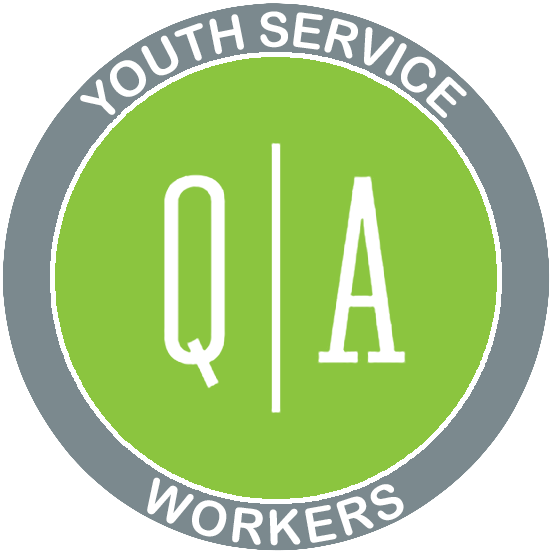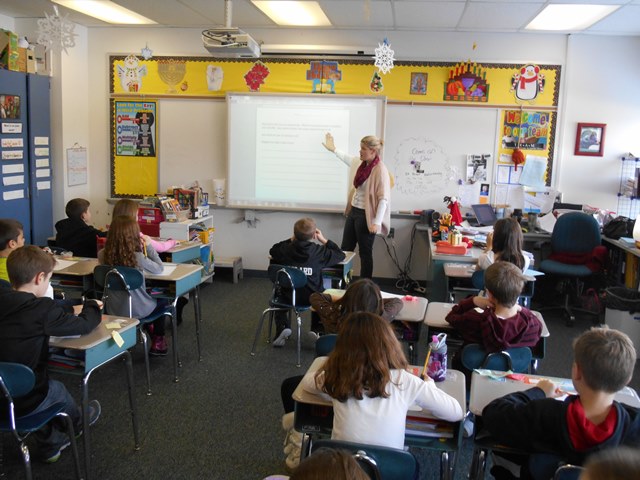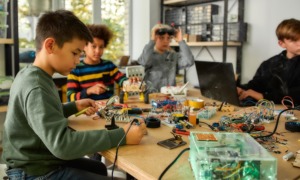Nora Gajewski is the site coordinator at the Bassett Elementary school for Project Link, the before- and after-school program at the Westlake K-12 School District in Westlake, Ohio. OST Hub editor Sara Hill asked her a series of questions about her work. Her answers have been lightly edited for length.
Q: Tell me how you started in the field.
A: I went to college for early childhood education, and when I graduated I worked in retail for about a year. I moved to Ohio in 2015 because my husband accepted a job offer and I worked in a Goddard School, similar to a charter school. I taught 3- to 4-year-olds.
I got a job working for the Westlake city schools as a coordinator for their before- and after-school program, Project Link. I’ve been working here for about a year. In the morning I have a program that runs from 6:30 a.m. to 8 a.m. before school starts. We do a lot of manipulatives, building, art projects, and gym games to release energy before they go to class. They also get a snack. In the afternoon the program starts at 2:15 and goes to 6 p.m. During that time the kids come down to us, get a snack, and after a snack we have recess. Then we do homework; afterward a large group activity, such as a science experiment. Each week we have a theme, and visitors come in to talk to the kids, and it’s aligned with the theme. For example, we have a football week and a fire safety week. A photographer comes in during our art week.
Q: What did you learn that you wish you knew from the start of your career as a youth worker?
 A: That not everything you plan goes as planned. For example, we have 50 to 60 kids a day. I plan on activities but things come up, like shortness of staff or behavior issues. I have to always rethink everything to accommodate the situation.
A: That not everything you plan goes as planned. For example, we have 50 to 60 kids a day. I plan on activities but things come up, like shortness of staff or behavior issues. I have to always rethink everything to accommodate the situation.
Q: What are the biggest changes you’ve seen at your before- and after-school program? In the out-of-school time field?
A: The program has made me view teaching and education differently. I’ve seen a change in myself. I realized how my presence affects the entire program and the tone of the room. We’ve been working to make our program more professional (this is a new policy coming from the administration). We’re increasing our requirements for what we’re looking for in a staff member. We’re asking them to do more than just your after-school babysitting job. They have to work with me to create our daily schedule, how to incorporate what students are learning during the school day to extend what they’re learning into the after-school. We modify it because I want it to be hands-on, fun — I try to get the kids outside as much as possible to incorporate the outside world. I talk with the school-day teachers at least once a week.
Q: How have you handled those changes?
A: There has been some resistance from staff because they’re not sure what their new duties are. I have to do a lot more explaining on my end. Not everyone has the same background as I do. I explain why it’s important, and why it will work. I work with my supervisors and they help me manage change, especially because I supervise people who are older than I am.
Q: How do you battle burnout and stay resilient?
A: I do the activities with the kids when I’m feeling burnt out. Instead of focusing the program, the paperwork, and dealing with the parents, I do art with the kids or go play a game with the kids or build something with them. I take a break and play.
Q: What are your dreams?
A: For this program, with all the new requirements, I think we’re going in a new direction. I have new staff members who have different strengths. I just hired someone with expertise in literacy, and she wants to do a lot with STEM, she’s interested and driven, and willing. I plan to continue working here, learning from my peers, learning from my supervisors. I want to make the program fun, and professional, and explore all the ways that young people can learn outside of the classroom.
Q: What’s some advice you would give someone entering the out-of-school time field?
A: If you’re not having fun, the kids probably aren’t having fun. It’s easy to get lost in the requirements and the daily business. You need to take a step back and think, “Am I sitting here, stressed, watching the clock?” If so, you need to change it up, visit another classroom and get the kids up and moving.
































